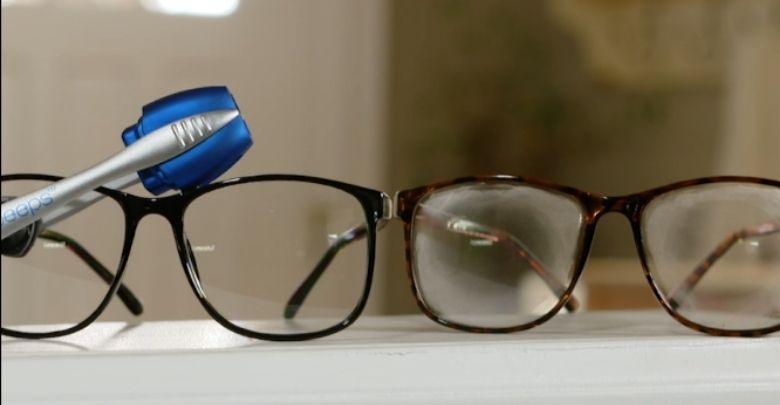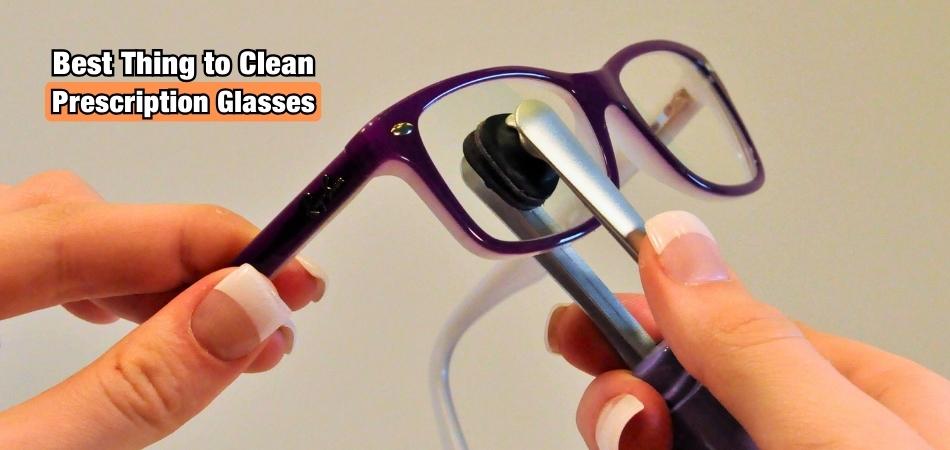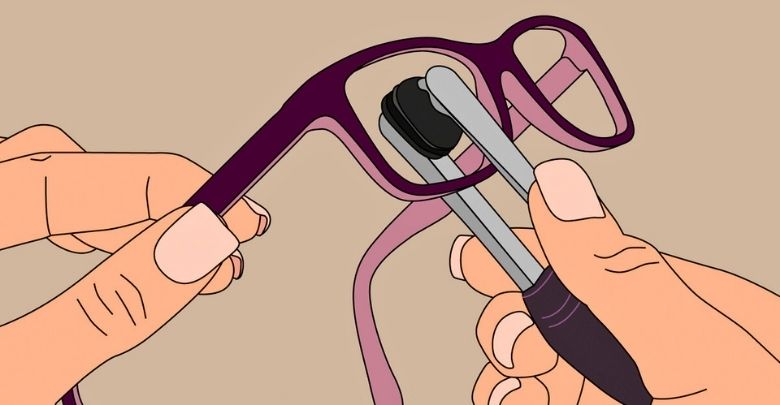Prescription glasses are essential for clear vision, but they require proper care to stay in great condition. Keeping them clean can be challenging if you’re unsure of the right methods. You might be wondering what is the best thing to clean prescription glasses with.
The best way to clean prescription glasses is by using a microfiber cloth and a lens-friendly cleaning solution. These cleaners effectively remove smudges, dirt, and fingerprints without damaging the lenses. Rinsing the glasses under lukewarm water before wiping is also crucial to avoid scratches.
Are you curious about the safest and most effective ways to clean your glasses? This article provides all the information you need, including tips, tools, and common mistakes to avoid, ensuring your lenses stay spotless and scratch-free.
Why Is Proper Cleaning Essential for Prescription Glasses?
Proper cleaning of prescription glasses is crucial to maintaining clear vision and preserving the lifespan of your lenses. Dirty lenses can obscure your sight, leading to eye strain and discomfort. Regular cleaning ensures your glasses stay in optimal condition and deliver the clarity you need.

Improper cleaning methods, such as using rough materials or harsh chemicals, can scratch or damage the lens coating. Over time, this can reduce the effectiveness of your glasses and compromise their durability. Using the right techniques and tools is key to keeping your lenses free of smudges and scratches.
However, specialized tools like Peeps by Carbon Klean are designed to clean glasses effectively without causing damage. With its carbon-based cleaning pads, Peeps safely removes fingerprints, dust, and smudges, providing a convenient and reliable way to care for your lenses.
What Is the Best Thing to Clean Prescription Glasses With?
Keeping your prescription glasses clean is essential for clear vision and maintaining their durability. Using the right tools and methods prevents damage and ensures your lenses stay in optimal condition. Here are the best practices for cleaning prescription glasses.

Use a Microfiber Cloth
Microfiber cloths are specifically designed to clean lenses without scratching or leaving lint behind. Their soft fibers effectively remove smudges, dirt, and dust while being gentle on lens coatings. Unlike tissues or paper towels, microfiber cloths won’t cause scratches or abrasions. Always keep one handy for quick touch-ups throughout the day. Regularly wash the microfiber cloth to keep it free from dirt and oils that can transfer to your lenses.
Rinse with Lukewarm Water
Rinsing your glasses with lukewarm water before wiping them helps to remove loose dirt and debris. This step prevents particles from scratching the lenses during cleaning. Avoid hot water, as it can damage lens coatings or frames. Running water also helps to remove oily residues for a clearer finish. For best results, use a gentle flow of water to avoid bending or damaging delicate parts of your glasses.
Use Lens Cleaning Solutions
Lens cleaning sprays are specially formulated to clean prescription glasses without harming the lens material or coating. These solutions effectively dissolve smudges, grease, and fingerprints, leaving your glasses streak-free. Avoid household cleaners, as they can contain harsh chemicals that may damage the lenses or frames. Pair the solution with a microfiber cloth for a streak-free and polished result.
Avoid Harsh Cleaning Materials
Never use rough or abrasive materials like paper towels, clothing, or tissues to clean your lenses. These materials can leave scratches, causing permanent damage to the lenses. Similarly, avoid using products like vinegar, ammonia, or window cleaners, as they can strip away the protective coatings on your lenses. Sticking to safe cleaning materials will ensure your glasses maintain their clarity and durability over time.
Try Peeps By Carbon Klean
For a highly effective and portable cleaning solution, consider using Peeps by Carbon Klean. This innovative tool uses carbon-based cleaning pads to safely remove dirt, fingerprints, and smudges from your lenses. Designed specifically for glasses, it is compact, easy to use, and ensures thorough cleaning without scratching. Furthermore, this useful device is environmentally friendly and reusable, making it an excellent choice for maintaining clean lenses.
Clean Both the Lenses and Frames
While focusing on lenses is important, don’t overlook the frames. Dust and oils can accumulate on the frames, especially around the nose pads and hinges. Use a damp cloth or a soft brush to clean these areas gently. Keeping your frames clean improves hygiene and improves the overall appearance of your glasses. Cleaning the frames also prevents dirt buildup that could transfer to your lenses.
Store Glasses Properly
Proper storage is just as important as cleaning. Always use a protective case when your glasses are not in use to prevent dust buildup and accidental damage. A hard-shell case offers the best protection for lenses and frames, helping maintain their quality over time. Keeping your glasses stored properly also reduces the risk of misplacing or damaging them.
Common Mistakes to Avoid When Cleaning Your Glasses
Cleaning your glasses may seem straightforward, but common mistakes can damage your lenses or frames. Being aware of these errors and using proper techniques ensures your glasses remain in top condition and provide clear vision.
Using Rough or Abrasive Materials
One of the most common mistakes is using rough materials like tissues, paper towels, or the hem of your shirt to clean your glasses. These materials can scratch your lenses, especially if there’s dirt or debris on the surface. Always use a microfiber cloth designed specifically for cleaning lenses to avoid unnecessary damage.
Skipping the Rinse Step
Failing to rinse your glasses before wiping them can lead to scratches caused by dirt or particles on the lenses. Rinsing with lukewarm water removes loose debris, preventing it from being dragged across the lens surface during cleaning. This simple step significantly extends the life of your glasses and ensures streak-free clarity.
Using Harsh Cleaning Products
Household cleaners like window sprays or bleach may seem effective, but they can strip away the protective coating on your lenses. These products often contain ammonia or other chemicals unsuitable for glasses. Opt for specialized lens cleaning solutions, and consider understanding eyeglass cleaner ingredients to ensure you’re using a product safe for your lenses and coatings.
Neglecting to Clean the Frames
Focusing only on the lenses and neglecting the frames can lead to a buildup of dirt, oils, and bacteria, especially around the nose pads and hinges. Over time, this can affect the hygiene and appearance of your glasses. Clean the frames with a damp cloth or mild soap and water to maintain their quality and comfort.
Using Hot Water
Many people think hot water is better for cleaning, but it can warp your frames and damage lens coatings. Instead, use lukewarm water to rinse your glasses safely. Avoid exposing your glasses to extreme temperatures, as this can lead to discolouration or structural weakening over time.
Rubbing Lenses When Dry
Rubbing your lenses while they are dry is a common mistake that can cause micro-scratches. Even the softest cloth can create abrasions if the lenses are not wet. Always dampen your lenses with water or a cleaning solution before wiping them to ensure smooth and safe cleaning.
Storing Glasses Improperly
Throwing your glasses into a bag or placing them face down on a surface can lead to scratches and damage. Always store your glasses in a protective case when not in use. Proper storage prevents accidental impacts, reduces exposure to dirt, and prolongs the life of your eyewear.
How to Clean Prescription Glasses Without Causing Scratches?
Cleaning prescription glasses properly is essential to maintaining their clarity and ensuring their longevity. Using the right techniques prevents scratches and keeps your lenses in top condition. Follow these steps to safely clean your glasses.

Rinse Lenses with Lukewarm Water
Let your glasses soak in lukewarm water for a few minutes. This removes loose dirt and dust particles that can cause scratches if wiped directly. Avoid using hot water, as it can damage the lens coatings. A quick rinse ensures your lenses are ready for safe cleaning. Ensure you rinse the entire frame to remove any dirt stuck in the hinges or edges.
Use a Lens-Friendly Cleaning Solution
Apply a lens-specific cleaning solution to your glasses. These products are formulated to clean without harming the lenses or their coatings. Avoid household cleaners like window sprays, as they can strip protective layers. Following this step ensures you can clean your glasses like a pro, avoiding damage while achieving streak-free clarity. A few drops are usually enough to cover the surface and loosen smudges effectively.
Choose a Microfiber Cloth
Always use a microfiber cloth to wipe your lenses. These clothes are soft, lint-free, and designed to pick up dirt without scratching. Avoid using tissues, paper towels, or clothing, as they can leave scratches or lint. Keep a clean microfiber cloth handy to maintain clear lenses at all times. Wash your microfiber cloth regularly to avoid transferring dirt back onto your glasses.
Clean the Frames Along with the Lenses
Don’t overlook the frames when cleaning your glasses. Use a damp cloth or mild soap solution to remove oils, dirt, and bacteria from the frames, especially around the nose pads and hinges. A clean frame not only ensures hygiene but also prevents transferring grime onto your lenses. Pay special attention to areas that come into contact with your skin to prevent irritation or buildup.
Avoid Dry Cleaning Your Glasses
Never attempt to clean your glasses while they’re dry. Rubbing the lenses without moisture can lead to micro-scratches. Always wet your lenses with water or a cleaning solution before wiping. This step ensures a safe and effective cleaning process. Dry cleaning often spreads dirt around, making lenses appear smudged rather than clean.
Handle Glasses Carefully
Hold your glasses securely by the frame while cleaning. Avoid putting pressure on the lenses, as this can cause bending or warping. Proper handling protects both the lenses and the frame, ensuring they remain intact during the cleaning process. Always clean over a soft surface to prevent damage in case you drop them.
Tips for Keeping Your Glasses Smudge-Free All Day
Keeping your glasses smudge-free all day can feel challenging, but with a few simple habits, you can maintain clear lenses effortlessly. Here are practical tips to help you avoid smudges and ensure uninterrupted vision.
- Clean Your Glasses Regularly: Start your day by cleaning your glasses with a lens-friendly solution and a microfiber cloth. Regular cleaning removes any oil or dirt that could later spread across the lenses.
- Avoid Touching Your Lenses: Touching your lenses transfers oils and dirt from your fingers to the surface. Always handle your glasses by the frame to keep them smudge-free.
- Use Anti-Smudge Coatings: Invest in lenses with anti-smudge or oleophobic coatings. These coatings repel oils and make it easier to wipe away dirt or fingerprints.
- Carry a Microfiber Cloth: Keep a microfiber cloth with you for quick touch-ups throughout the day. Unlike tissues or clothing, microfiber won’t scratch your lenses or leave lint behind.
- Avoid Applying Lotions or Makeup Near Your Glasses: Lotions and makeup can transfer to your glasses, leaving streaks and smudges. Allow skincare products to dry fully before putting on your glasses.
- Store Your Glasses in a Case: When not in use, store your glasses in a protective case to prevent dirt and debris from settling on the lenses. A clean storage case helps ensure smudge-free lenses when you put them back on.
- Use Lens Wipes for Quick Cleaning: Carry disposable lens wipes for on-the-go cleaning. These pre-moistened wipes are designed to remove smudges and streaks without damaging the lenses.
- Avoid Steamy or Humid Environments: Steamy settings, like kitchens or saunas, can cause fogging and attract smudges. If unavoidable, use an anti-fog spray to protect your lenses from condensation.
Questions and Answers
Proper cleaning of prescription glasses prolongs their durability, ensures clarity, and guards against scratches. If you’ve ever wondered about the most effective methods or tools for keeping your lenses spotless, you may have additional questions. Here are answers to some frequently asked queries to provide more clarity on the topic.
What Is the Best Way to Dry Glasses After Cleaning?
The best way to dry glasses is by using a clean, lint-free microfiber cloth. Gently pat the lenses dry instead of rubbing them, as rubbing can cause scratches. Avoid air-drying, as this may leave water spots that can obscure your vision.
Can Dish Soap Be Used to Clean Prescription Glasses?
Yes, mild, lotion-free dish soap can safely clean prescription glasses. Use a tiny drop on each lens and rinse thoroughly under lukewarm water. Ensure you avoid soaps with added fragrances or moisturizers, as they may leave residue on the lenses.
Are Anti-Fog Solutions Useful for Everyday Cleaning?
Anti-fog solutions are effective for preventing lens fogging but aren’t ideal for daily cleaning. Use them as an additional layer of protection in humid conditions or while wearing masks. Pair them with a lens-friendly cleaning method for optimal results.
How Can I Clean Glasses While Traveling?
Travel-friendly options like disposable lens wipes or portable cleaning tools like Peeps by Carbon Klean are perfect for on-the-go cleaning. These items are compact, effective, and safe for lenses, ensuring your glasses remain clear and scratch-free while you’re away from home.
Is It Necessary to Clean the Frames as Often as the Lenses?
Yes, cleaning frames is just as important as cleaning lenses. Dirt and oils from the nose pads, hinges, and edges can transfer to the lenses over time. Regularly cleaning the frames improves hygiene and maintains the overall condition of your glasses.
Final Thought
If you want to clean prescription glasses properly, you must use the right tools and techniques. The best way to clean them is by using a microfiber cloth, lukewarm water, and a lens-friendly cleaning solution. These methods ensure spotless and scratch-free lenses, answering what is the best thing to clean prescription glasses with?
To maintain clear lenses, clean your glasses daily, avoid harsh chemicals, and always store them in a protective case. Treat your glasses gently and handle them by the frames to prevent smudges. We wish you the best in keeping your glasses clean and your vision crystal clear!






